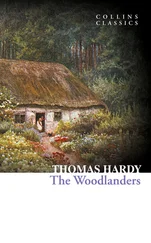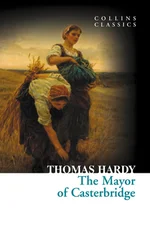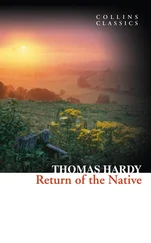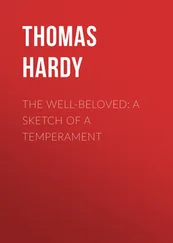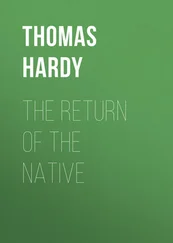The last pages to which the chronicler of these lives would ask the reader's attention are concerned with the scene in and out of Jude's bedroom when leafy summer came round again.
His face was now so thin that his old friends would hardly have known him. It was afternoon, and Arabella was at the looking-glass curling her hair, which operation she performed by heating an umbrella-stay in the flame of a candle she had lighted, and using it upon the flowing lock. When she had finished this, practised a dimple, and put on her things, she cast her eyes round upon Jude. He seemed to be sleeping, though his position was an elevated one, his malady preventing him lying down.
Arabella, hatted, gloved, and ready, sat down and waited, as if expecting some one to come and take her place as nurse.
Certain sounds from without revealed that the town was in festivity, though little of the festival, whatever it might have been, could be seen here. Bells began to ring, and the notes came into the room through the open window, and travelled round Jude's head in a hum. They made her restless, and at last she said to herself: "Why ever doesn't Father come!"
She looked again at Jude, critically gauged his ebbing life, as she had done so many times during the late months, and glancing at his watch, which was hung up by way of timepiece, rose impatiently. Still he slept, and coming to a resolution she slipped from the room, closed the door noiselessly, and descended the stairs. The house was empty. The attraction which moved Arabella to go abroad had evidently drawn away the other inmates long before.
It was a warm, cloudless, enticing day. She shut the front door, and hastened round into Chief Street, and when near the theatre could hear the notes of the organ, a rehearsal for a coming concert being in progress. She entered under the archway of Oldgate College, where men were putting up awnings round the quadrangle for a ball in the hall that evening. People who had come up from the country for the day were picnicking on the grass, and Arabella walked along the gravel paths and under the aged limes. But finding this place rather dull she returned to the streets, and watched the carriages drawing up for the concert, numerous dons and their wives, and undergraduates with gay female companions, crowding up likewise. When the doors were closed, and the concert began, she moved on.
The powerful notes of that concert rolled forth through the swinging yellow blinds of the open windows, over the housetops, and into the still air of the lanes. They reached so far as to the room in which Jude lay; and it was about this time that his cough began again and awakened him.
As soon as he could speak he murmured, his eyes still closed: "A little water, please."
Nothing but the deserted room received his appeal, and he coughed to exhaustion again—saying still more feebly: "Water—some water—Sue—Arabella!"
The room remained still as before. Presently he gasped again: "Throat—water—Sue—darling—drop of water—please—oh please!"
No water came, and the organ notes, faint as a bee's hum, rolled in as before.
While he remained, his face changing, shouts and hurrahs came from somewhere in the direction of the river.
"Ah—yes! The Remembrance games," he murmured. "And I here. And Sue defiled!"
The hurrahs were repeated, drowning the faint organ notes. Jude's face changed more: he whispered slowly, his parched lips scarcely moving:
"Let the day perish wherein I was born, and the night in which it was said, There is a man-child conceived."
("Hurrah!")
"Let that day be darkness; let not God regard it from above, neither let the light shine upon it. Lo, let that night be solitary, let no joyful voice come therein."
("Hurrah!")
"Why died I not from the womb? Why did i not give up the ghost when I came out of the belly? … For now should I have lain still and been quiet. I should have slept: then had I been at rest!"
("Hurrah!")
"There the prisoners rest together; they hear not the voice of the oppressor… The small and the great are there; and the servant is free from his master. Wherefore is light given to him that is in misery, and life unto the bitter in soul?"
Meanwhile Arabella, in her journey to discover what was going on, took a short cut down a narrow street and through an obscure nook into the quad of Cardinal. It was full of bustle, and brilliant in the sunlight with flowers and other preparations for a ball here also. A carpenter nodded to her, one who had formerly been a fellow-workman of Jude's. A corridor was in course of erection from the entrance to the hall staircase, of gay red and buff bunting. Waggon-loads of boxes containing bright plants in full bloom were being placed about, and the great staircase was covered with red cloth. She nodded to one workman and another, and ascended to the hall on the strength of their acquaintance, where they were putting down a new floor and decorating for the dance.
The cathedral bell close at hand was sounding for five o'clock service.
"I should not mind having a spin there with a fellow's arm round my waist," she said to one of the men. "But Lord, I must be getting home again—there's a lot to do. No dancing for me!"
When she reached home she was met at the door by Stagg, and one or two other of Jude's fellow stoneworkers. "We are just going down to the river," said the former, "to see the boat-bumping. But we've called round on our way to ask how your husband is."
"He's sleeping nicely, thank you," said Arabella.
"That's right. Well now, can't you give yourself half an hour's relaxation, Mrs. Fawley, and come along with us? 'Twould do you good."
"I should like to go," said she. "I've never seen the boat-racing, and I hear it is good fun."
"Come along!"
"How I wish I could!" She looked longingly down the street. "Wait a minute, then. I'll just run up and see how he is now. Father is with him, I believe; so I can most likely come."
They waited, and she entered. Downstairs the inmates were absent as before, having, in fact, gone in a body to the river where the procession of boats was to pass. When she reached the bedroom she found that her father had not even now come.
"Why couldn't he have been here!" she said impatiently. "He wants to see the boats himself—that's what it is!"
However, on looking round to the bed she brightened, for she saw that Jude was apparently sleeping, though he was not in the usual half-elevated posture necessitated by his cough. He had slipped down, and lay flat. A second glance caused her to start, and she went to the bed. His face was quite white, and gradually becoming rigid. She touched his fingers; they were cold, though his body was still warm. She listened at his chest. All was still within. The bumping of near thirty years had ceased.
After her first appalled sense of what had happened the faint notes of a military or other brass band from the river reached her ears; and in a provoked tone she exclaimed, "To think he should die just now! Why did he die just now!" Then meditating another moment or two she went to the door, softly closed it as before, and again descended the stairs.
"Here she is!" said one of the workmen. "We wondered if you were coming after all. Come along; we must be quick to get a good place… Well, how is he? Sleeping well still? Of course, we don't want to drag 'ee away if—"
"Oh yes—sleeping quite sound. He won't wake yet," she said hurriedly.
They went with the crowd down Cardinal Street, where they presently reached the bridge, and the gay barges burst upon their view. Thence they passed by a narrow slit down to the riverside path—now dusty, hot, and thronged. Almost as soon as they had arrived the grand procession of boats began; the oars smacking with a loud kiss on the face of the stream, as they were lowered from the perpendicular.
Читать дальше

